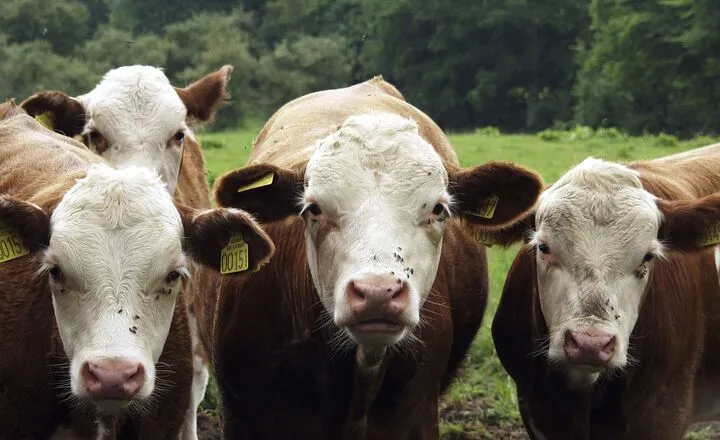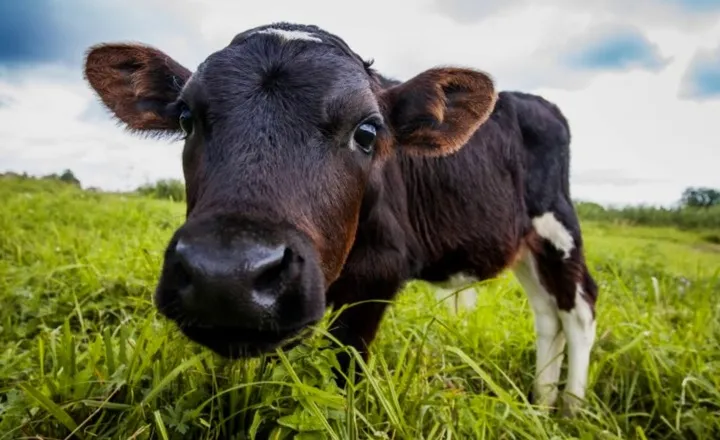Have you ever found yourself locked in a staring contest with a cow? The unblinking gaze of these gentle giants can be both mesmerizing and slightly unsettling. But have you ever wondered why cows stare so intently at us humans?
Boredom, or perhaps something more mysterious at play? From their innate social hierarchy to their keen observation skills, prepare to be amazed by the secrets hidden within those deep, soulful eyes of our beloved farm companions.
Why Do Cows Stare at You?
Cows often stare at humans out of curiosity or as a way to assess potential threats. As prey animals, cows have a natural instinct to be vigilant and aware of their surroundings.
When they encounter something unfamiliar or potentially dangerous, such as a person approaching them, they may stare to gather more information and decide how to respond.
Cows are social animals that rely on visual cues to communicate with each other. Staring can be a form of communication among cows, so when they stare at humans, it could be their way of trying to understand the intentions or emotions of the person in front of them.
They stare to get Attention
Domestic animals indeed have unique ways of showing their affection and seeking attention from their human companions.
Whether it’s a cat purring on your lap, a dog wagging its tail excitedly, a horse nuzzling you gently, or a cow gazing at you with big, soulful eyes, these gestures are all expressions of their love and desire for connection.
Animals are incredibly intuitive and can sense our emotions, making them attuned to our needs for companionship and comfort.
When animals stare directly into your eyes with an endearing gaze, it’s often a way for them to establish trust and deepen the bond between you.
This direct eye contact can convey feelings of loyalty, gratitude, and even a form of communication that transcends words.
They stare Because cows are Naturally Inquisitive
They rely on their keen sense of observation to assess potential threats or new stimuli in their environment. When a cow stares at you, it may simply be trying to understand more about you or your actions.
They have a strong social hierarchy within their herds, and staring can also be a form of communication among themselves. By maintaining eye contact with each other, cows can establish dominance or submission within the group.
They stare to express love and appreciation
While dogs and cats may use more common gestures like licking or jumping, cows often express their affection through staring. This act of gazing at their caretakers can be seen as a way for them to admire the bond that has been formed between them.

The simple act of a cow staring at its keeper can be quite powerful in conveying feelings of love and appreciation. It serves as a reminder that animals, regardless of their species, are capable of forming deep emotional connections with humans.
They stare for food
Cows have a keen sense of observation and will closely watch any unusual objects or movements in their surroundings. They may stare at their feeders or livestock keepers in hopes of getting food.
The intense gaze from a hungry cow is usually a way for them to assess whether food is about to be served or if the keeper has something edible in their hands. This behavior is a natural instinct for cows as they try to ensure their survival by identifying potential sources of sustenance.
Communicate
Through a combination of body language, vocalizations, and even scents, they are able to convey messages and emotions to their fellow animals. Cows are known for using eye contact as a form of communication, allowing them to establish connections and understand the feelings of their herd mates.
By observing the behaviors and interactions of animals like cows, we can gain a deeper understanding of the complex communication systems that exist beyond human language.
It’s fascinating to see how these creatures navigate their social relationships and express themselves through non-verbal cues. This serves as a reminder that communication is not limited to words but can be expressed in various forms across different species.
Attack
When faced with a potential threat, cows can exhibit aggressive behavior in order to protect their young. This instinctual response is a natural part of their maternal instincts and survival mechanisms.
Predators such as wolves or coyotes may pose a threat to cows and their calves. They will often gather together in a defensive formation, using their size and strength to ward off the predator.

This demonstrates the strong bond between cows and their offspring, as well as their ability to adapt and respond to different threats in their environment.
Disapprove
When a cow disapproves of another animal in the herd, it may display signs of aggression or discomfort towards that particular animal. This can manifest as a deadly stare or even physical confrontation in some cases.
It is essential for farmers and caretakers to be aware of these dynamics within the herd and ensure the well-being of all animals involved.
Conclusion
The behavior of cows staring at humans is likely a combination of curiosity, social hierarchy, and natural instincts for survival. While it may seem unnerving or amusing to be on the receiving end of a cow’s intense gaze, it is important to remember that these animals are intelligent and highly perceptive beings.
By understanding and respecting their behaviors, we can develop a deeper appreciation for the complex lives of cows and the role they play in our world.
Next time you find yourself being stared at by a cow, take a moment to observe them back and appreciate the connection between humans and these gentle creatures.
FAQs
Do cows recognize human faces?
Cows do have the ability to recognize human faces, although their level of recognition may vary. Research has shown that cows are able to distinguish between different individual faces.
Why do cows moo when they see you?
Cows moo when they see you as a form of communication. It is their way of expressing curiosity, excitement, or even a warning signal.
